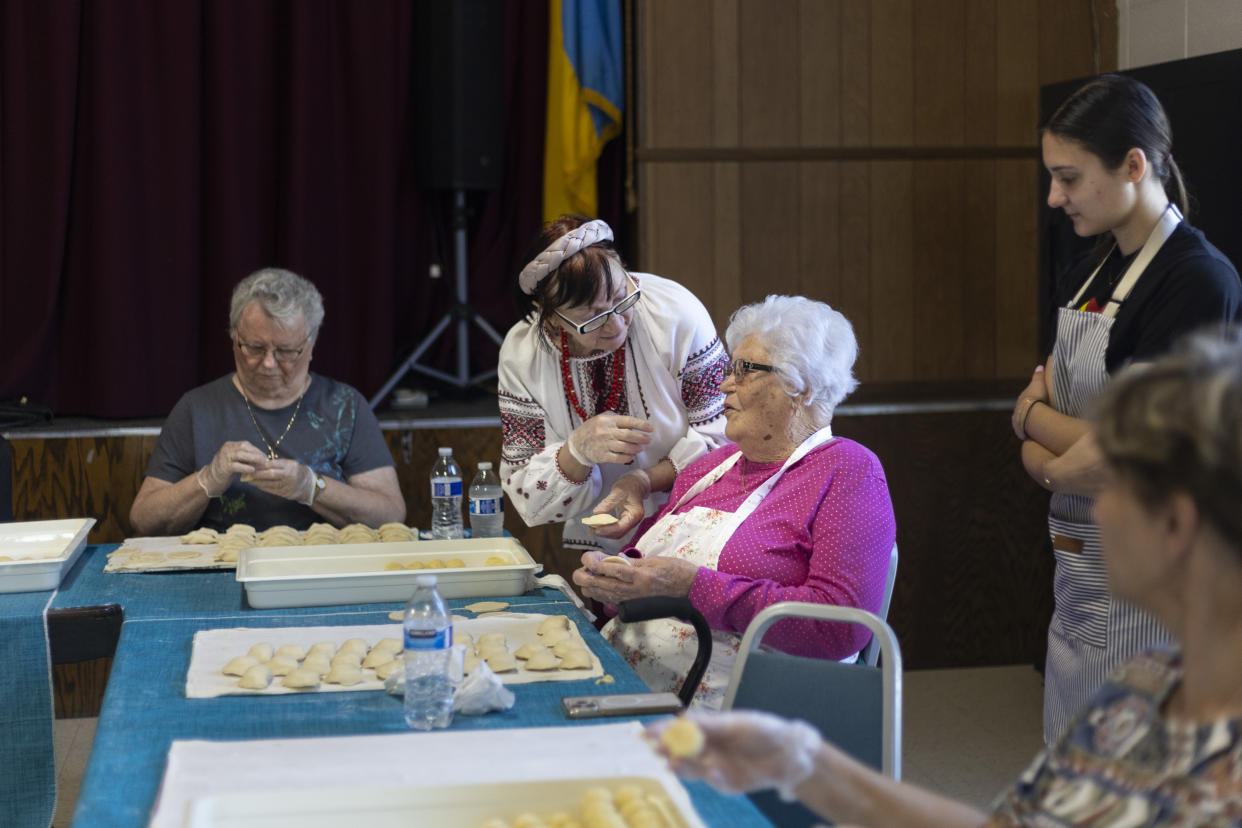Northwest Indiana Ukrainians overcome anxiety, stress of war through community

The small gymnasium and kitchen at St. Josaphat Ukrainian Catholic Church in Munster was bustling on a recent Friday as about 20 people worked in stations to make pierogi for the final time before the summer break.
A woman carried over flour-covered dough cut in circles that fit perfectly in the palm of a hand. Then, other women took circles of stuffing, like potato, and placed it in the center of the dough.
With flour-coated fingers, they carefully covered the stuffing with the dough before pinching it closed. With each pinch, the women used precise and fluid motions, exposing their decades of experience making pierogi.
As the war in Ukraine begins its third year, the women making pierogi take comfort in community as they manage the stress and anxiety of life moving forward amid war.
Olga Schulz, 62, said through Olha Kushnir, that it’s difficult to find the words that most accurately explain how she has felt the last two years.
“She goes about her daily life, but it’s always on her mind the war, the soldiers fighting. It hurts,” Olha Kushnir said. “People are getting used to it. They’re not reacting the same way as it was when it started. They’re forced to move on with their daily lives.”
Since the war started, Schulz said some of her family has moved to different parts of the world, like her sister moving to Belgium and her daughter moving to Montenegro, while her 90-year-old mother has stayed in Dnipro, where Schulz grew up.
At the start of the war, Schulz said she would cry every day. At that time, Schulz said she had the added stress of worrying about her pregnant daughter escaping the war.
Schulz smiles and her eyes brighten as she shows photos and videos of her 2-year-old grandson, who is safe in Montenegro with his parents. In one video, her grandson, wearing rain boots and a raincoat, stomps into a puddle.
Her daughter sends her photos of her grandson every morning, Schulz said, a daily dose of relief that they are safe.
“It helps me get through,” Schulz said.
But as the comfort of the day’s photo or video fades slightly, Schulz said she starts to worry about her mother’s safety. Then, Schulz said her mind goes to all the Ukrainian lives lost, soldiers dying in battle and young women and children dying as buildings are bombed.
The end of the war feels distant to her, Schulz said, because it seems that Russian President Vladimir Putin wants to claim as much of Ukraine as possible.
“I’m very angry. I’m still angry. I can’t accept it because it is getting worse and worse. Two years ago, we had hope it will be over pretty soon. But now, Putin is not going to stop so it’s getting worse,” Schulz said.
Oksana Kushnir said her parents, her sister, her brother-in-law and their children live near Ivano-Frankivsk, which is in Western Ukraine. When she talks to her family, they tell her about hearing sirens and hiding in bomb shelters, and she hears the stress in their voices.
“You never can be relaxed and do your stuff without worrying, without thinking about when it’s going to happen and how long it’s going to last,” Oksana Kushnir said.
Three Ukrainian families who escaped war have come to St. Josaphat Ukrainian Catholic Church in Munster to connect with their community and religion, Oksana Kushnir said.
In speaking with these families, Oksana Kushnir said it was clear they miss Ukraine, their families and friends, their homes and their jobs.
“To immigrate to different country when you’re basically forced to not with your will is two different things,” Oksana Kushnir said. “To come in your 40s when you achieve some level in your country and you have family, you have friends, you have work, you have everything there, and to leave everything and go to new country, start from the scratch, with language, with low paid work, is difficult.”
The Rev. Volodymyr Kushnir, the pastor of St. Josaphat Ukrainian Catholic Church in Munster, said people who leave their native country look for pieces of their homeland and culture within the place they settle in.
When the Ukrainian families came to the church in Munster, they were able to speak their native language, find community and practice their religion, Volodymyr Kushnir said.
While the families were trying to be positive about their circumstances, he said there have been moments of distress when something does not go as planned.
“We give them this relief and support,” Volodymyr Kushnir said. “We’re trying to reassure them just be patient, take one step at a time and go step by step to those goals that they put in front of them.”
Volodymyr Kushnir said his parents have stayed in their home in Ivano-Frankivsk throughout the war. From December to April, Volodymyr Kushinr said his parents visited him and his family in Munster.
“They were able to see their grandchildren, spend time with us and change the environment from being constantly under this pressure of the war emotionally. For them, I believe it was a relief for a while,” Volodymyr Kushnir said.
On a recent Friday, Volodymyr Kushnir joined a virtual meeting led by a military chaplain who talked about faith amid the war.
The chaplain said the hardest part of his job has been notifying soldiers’ families about their death, Volodymyr Kushnir said. Then, after the family is notified, the chaplain said another difficult part of the job is talking to other soldiers who question why they survived.
Ukraine is a strong nation, Volodymyr Kushnir said, and its people won’t give up.
“This war will continue as long as Ukrainians will live and fight,” Volodymyr Kushnir said. “I believe there will be the end of this war pretty soon. Hopefully soon. We have to believe, there’s no choice. No other options.”

